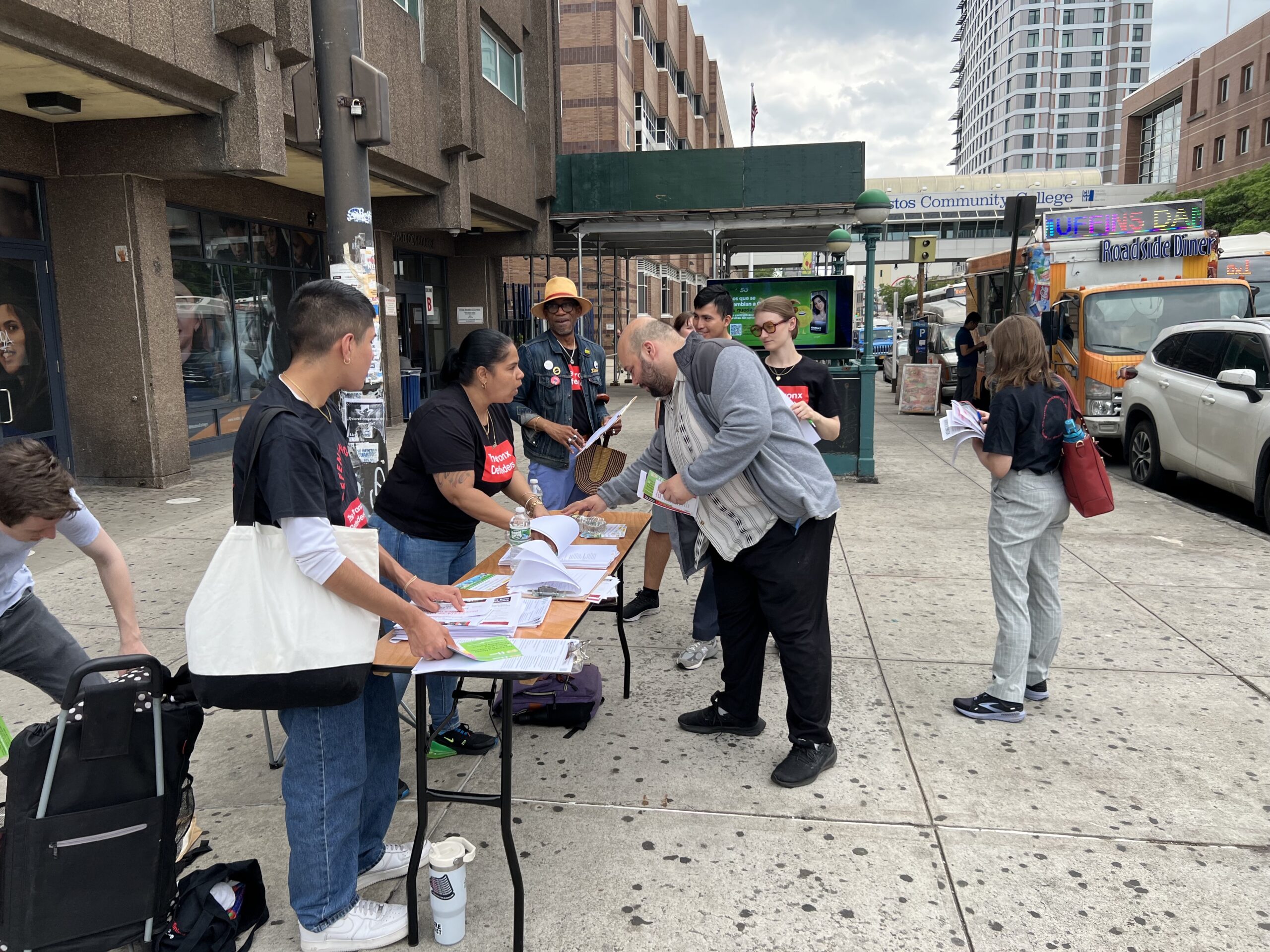On Thursday, teams of volunteers spread out across the South Bronx to ask a simple question: How would you spend $5 million to help your neighborhood?
The volunteers were collecting votes for the People’s Money, a citywide participatory budgeting process led by the Civic Engagement Commission. New Yorkers will have until June 25th to vote on the proposed projects, which range from funding migrant job training to summer camps for special-needs kids.
“Community members are able to vote for things that are built in their communities,” explained Shannon Barber, an organizer with the Bronx Defenders, who had set up his voting table next to the fruit and handbag vendors outside Lincoln Medical Center on 149th Street. “We’re not voting for the mayor, we’re not voting for the governor. We’re voting for which of these projects will be built in our community to better it.”
Participatory budgeting is a novel form of collective decision-making that originated in Brazil in 1989. Rather than rely on politicians to decide how the government will spend tax money, this process relies on ordinary citizens to propose, debate, and vote on the projects that are most important to them. Over 7,000 municipalities around the world have experimented with the idea, according to the nonprofit participatory budgeting project.
The city has experimented with participatory budgeting in the past. Some city councilmembers use participatory budgeting processes in order to allocate their discretionary funds within their districts, and a similar process was used by the Taskforce on Racial Inclusion & Equity last year.
This is the first participatory budgeting process on a citywide level, and with $5 million of mayoral expense funds, it is also the largest. It started in late 2022, when residents were invited to propose their ideas at neighborhood meetings. Over the winter, these proposals were refined and evaluated by volunteers. Only a handful of the original proposals are now being put forward to public vote.
“We want people to have a say in how that money is spent,” said Tamara Gilbert, a Fordham law student who is now interning with the Bronx Defenders. “It’s actual people who are living here, who are deciding how the money gets spent.”
The voting requirements for the People’s Money are less strict than those for ordinary elections. Any city resident over age 11 can vote, regardless of their immigration status or criminal history. Voting can be online, or in person at the voting sites listed on the website of the Civic Engagement Commission.
Within a few hours, the team at Morris Avenue had collected sixty or seventy ballots, according to Barber, and they were only one of the six teams that Bronx Defenders had sent out to reach voters.
Along with Bronx Defenders, other South Bronx community groups and schools also took to the streets to collect votes, including The Point CDC, Lion Charter High School in Hunts Point, Woodstock library, BronxWorks, and the Carolyn Mclaughlin Community Center.
Stathi Patseas, the communications director for the Civic Engagement Commission, estimates that “tens of thousands” of New Yorkers have already participated citywide.
While some Bronxites stopped to fill out ballots, others seemed too busy to show interest.
“It’s a great idea,” said Adelin, a 26-year-old cell phone vendor who preferred not to give her last name. “It’s something that the government should really look into and just invest in.”
But she decided not to vote after being approached by the Bronx Defenders team.
“I’m just not a voting person,” she said.
All Bronx residents can vote on eight proposals, The three with the most votes will be funded with $265,000 each. The eight proposals for the Bronx are:
- Workplace skills training for adults with autism
- Creating digital equity by connecting Bronx youth and adults
- Empowering migrant women
- Financial literacy classes for youth
- Youth life skills workshops
- Trauma-informed childcare workshops
- Summer camp for special needs youth
- Youth performing arts and screenwriting program
There are five more projects each for Hunts Point/Longwood and Mott Haven/Melrose. The leading proposal will get $50,000 in both areas.
The five proposals for Mott Haven/Melrose are:
- Uniting residents for a cleaner community
- Healthy living through intergenerational exchange
- Healing the South Bronx through the arts
- The South Bronx healthy living cooperative
- Workshops for youth teaching economic empowerment
The five proposals for Hunts Point/Longwood are:
- Classes on starting a Cannabis business
- Helping Hands Program;
- Improving mental health for children and their families
- Women’s business training program
- Workshops to help LGBTQIA youth and their families
The table listing the projects proposed for all neighborhoods citywide can be found here.
Bronx residents can vote online. The winning proposals will be announced in July.

